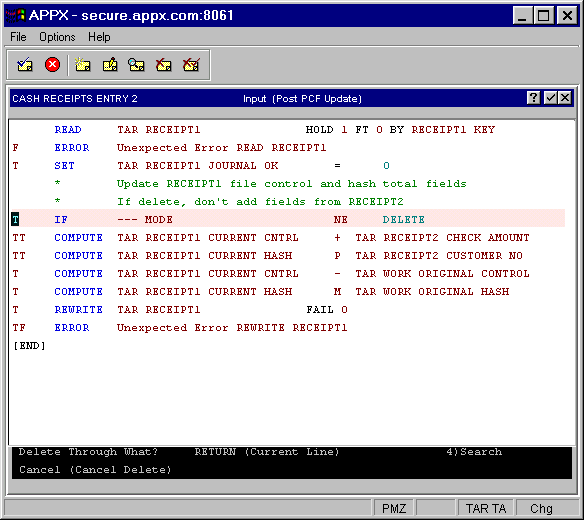


![]() DELETE
MODE
DELETE
MODE
Select this icon from the tool bar when you want to delete a single statement or a group of contiguous statements within an ILF routine. Position your cursor anywhere on the first (or only) line you want to delete. When you select delete mode, two things happen:
You automatically set a “delete marker” on the line where the cursor is positioned, and
You enter into delete mode with its own set of options.
When you select delete mode, the screen in Figure 4-4-8 displays.

Figure 4-4-8. An ILF Editor Screen in Delete Mode
The question Delete Through What? is now on the left side of the option area. Each option is described as follows:
· return (current line) By positioning the cursor (using First, Last, Previous, Next, Down, Up, the arrow keys, or search, described later in this chapter), you indicate to the system a second “delete marker.” The second marker, together with the original marker that you set before you selected delete mode, specifies the range of statements you want to delete. The second marker can be above (before) or below (after) the original marker in an ILF routine. The cursor can be positioned anywhere on the statement line. To delete a single statement, do not move the cursor from its current position. When you press enter, all statements within the specified range (including the statements with markers) are deleted. Until you press enter, no deletion occurs; the enter button triggers the delete operation.
·
![]() cancel
(cancel delete) cancels the deletion. Selecting this option from the tool bar returns you
to display mode. No statements are deleted if you select this option.
cancel
(cancel delete) cancels the deletion. Selecting this option from the tool bar returns you
to display mode. No statements are deleted if you select this option.
· search allows you to search for a particular word or string of characters to locate a particular statement line. Refer to the description of the search option later in this chapter.
APPX Application
Design Manual (01/13/03)



© 2003 by APPX Software, Inc. All rights reserved